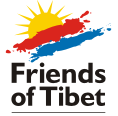"Civil Resistance in the Contemporary World" lecture by Tushar Gandhi
The Kerala History Museum, Kochi: On November 18, 2017, Friends of Tibet organised "Civil Resistance in the Contemporary World" lecture by Tushar Gandhi, Great-Grandson of Mahatma Gandhi and Chairman of Mahatma Gandhi Foundation at The Kerala History Museum, Edappally, Kerala. This is the second time Tushar Gandhi is delivering a lecture for Friends of Tibet in Kochi city. Last year he delivered a lecture on "Gandhian Strategy: Lessons for Our Times".
Given below is an edited transcript of Tushar Gandhi's lecture "Civil Resistance in the Contemporary World".
Thank you Friends of Tibet!
Sethu Das has a habit of always challenging me with subjects. The subject he chooses force me to do my homework. But the subject he chose — "Civil Resistance in the Contemporary World" is very relevant. We live in such times that we are being told that by questioning the government is anti-national. We are told that by questioning the government, we don't allow it to function in the proper manner. And so if we are patriotic we should not question anything and accept everything the way it is. I believe it is the severest threats to a democracy. I believe democracy survives only on the ability of the citizens to question and their right to get an answer from the government. So I believe civil resistance arises from that ability to ask questions or the inability of citizens to ask questions. When the right to ask questions is taken away, then we have to resort to civil resistance.
Bapu had very interesting thoughts on civil resistance. Very interesting two quotes of Bapu that came across which I feel are very relevant in today's times. He says "It is the duty of every citizen in a country to resist the government when it is not working for the benefit of the people or if they consider any law to be detrimental to the spirit of democracy. If they do not perform that duty, then we are being remiss in being citizens of that democracy". This means that in a democracy we become very lethargic. We feel that voting in every election is enough of a democratic duty to perform. After that it is the will of the government and the government can do what they please. By acting in such a manner, we encourage authoritarianism.
I have travelled extensively and I hold the system in Sweden very dear. Every law and every new policy by the government has to be ratified by a referendum. For example if the government decides to introduce a new tax, it has to be ratified not only by the parliament but it also has to be voted by the citizens. I know that in a country like India, it is very difficult to conduct a referendum for each and every law. But there have been so many amendments to our constitution. The constitution of a country is supposed to be inviolate. It is the document by which nationhood of that country is that decided. For all the amendments to the constitution, none of them was made after taking into account the voice of the people. Some of them have even been passed without a parliamentary debate. This is a very dangerous symptom in a democracy. This negates the spirit of democracy. I can understand that in a country like India, every law cannot be ratified. If all the laws passed have to go through a referendum, it becomes a very laborious process and costly exercise. But for something as vital as amendments to the constitution, we have no say in it. In fact we have not had a say in it for so long that now it is taken for granted that since in the past we didn't have a say, we can't have a say even today. Tax systems have been changed, tax structures have been changed, and personal laws have been changed. Never have we been able to voice our opinion. We have not even bothered to voice our opinion. There has never been a debate in civil society about this issue at all. So civil resistance or civil disobedience becomes very farfetched in a society that has been so lethargic about its democratic duties. We are not concerned at all about our own fate, our own ability to decide what is good and bad for us.
Going further from what Bapu's quote that it is our duty, I have to say that citizens who do not obey this diktat are not fit to live in a democracy. He said that it is compulsory for us to be reactive to the government's policies and laws. So if we do not do that then we not fit to be democratically governed. In 70 years, we have not had a single referendum on major issues. On issues even as important as when a prime minister arbitrarily suspended the constitution of India! Some of might not have been born at that time when Indira Gandhi imposed emergency. When emergency was imposed, we lost all our civil rights and the government decided what we could do and what we could not do. The severest punishments where meted out for defiance. When the emergency was lifted, the only thing we could do was to vote out the congress government for the first time after independence. Beyond that we could do nothing. So such dictatorial measures have been taken against us and we have not risen against it. Even in the emergency, the uprising happened in the form of a ballot. There were no protests in the form of a civil resistance or a mass movement in the streets. People could only take action during the next election at a later date.
In Bapu's case, he preached that if the government's policies seem to be anti-people, he preached sedition to be a virtue. This is a very powerful statement to make where even drawing a cartoon can lead to sedition charges against you. Here the father of the nation is preaching that it is the beholden duty of the people to practice sedition if they feel that the government is engaging in anti-people policies. But when he says that there should be civil resistance against unfair laws, he also says you are only allowed to practice sedition with regards to those unfair laws. You should maintain discipline regarding all other laws that are in effect in the nation. This seems very complicated. But he practiced this all his life. While he was protesting against the British Empire for equal rights, he was also reminding us that we are equally loyal citizens of the British Empire. So while he was protesting against the unequal treatment of the Asiatic population, he was also performing his duties as a stretcher bearer for the Boer war where he was active with his band of people and treated the wounded soldiers. They did not work in hospitals. They worked while the bullets where flying, picking up the wounded soldiers and taking them to the first aid camps and hospitals. They were not shot because they were performing that service for both sides. That is they served both the Dutch and the British soldiers. Soon word got around that we must not harm them since they will help if we get wounded. But he did not suspend his resistance against the prejudicial laws of the british. This is the moral courage and the moral ethicality that we must have while practicing civil disobedience. This is what will embarrass the government because they will not be able to brush you of as anti-nationals. This is due to the fact that for every other aspect, you are a patriot. You are only protesting against certain injustice.
In fact before Jallianwala Bagh, both Sardar Patel and Bapu helped the British recruit soldiers for the First World War. This baffled the British. They did not know whether to facilitate him for his patriotic actions or to punish him for his protests. This is the charm of civil resistance. But post Jallianwala Bagh, when the British tried to justify the massacre by exonerating General Dyer, he said that now it is immoral to be loyal to this empire. Then the complexion of the defiance changed. After that it was only defiance. So it has to be understood very well that there is a difference when we conduct a civil war to overthrow an empire and when we conduct civil resistance against a particular injustice.
Tushar Gandhi (Born: 1960) is the great-grandson of Mahatma Gandhi; grandson of Manilal Gandhi and son of Arun Gandhi. Chairman of Mahatma Gandhi Foundation, Gandhi is also a known writer and socio-political activist. He is involved in advocating and spreading Gandhian values and principles to address the problems and dilemmas faced by today's generation. Tushar Gandhi was the goodwill ambassador of CSIR-ISP Intergovernmental Institution. In March 2005, he led the 75th anniversary re-enactment of the historic 1930 Dandi March. He is also a part of the High Level Dandi Memorial Committee constituted by the Ministry of Culture, Government of India, a team that oversees the National Salt Satyagraha Memorial Project, Dandi, Gujarat. Tushar Gandhi is the author of the book "Let's Kill Gandhi".
Friends of Tibet Campaigner Yelthdo Mathew welcomes with a Malayalam poem by Prof Madhusoodanan Nair literally translated as 'Who Is Gandhi'. The poem talks about seven major rivers of India — Ganga, Yamuna, Saraswathi, Sindhu, Godawari, Kaveri and Narmada of which the banks are filled with different kinds altercations and violence between people. All the while a lesser known river like Sabarmathi is peaceful and calm. Yeldtho Mathew introduced Tushar Gandhi and invited him to the stage.
Noted political cartoonist and one of the contributors to 'Indian Cartoonists on Tibet', Yesudasan presents a Buddha Statue to Tushar Gandhi.
Tushar Gandhi launches 'Indian Cartoonists on Tibet' book project of Friends of Tibet with two political cartoonists from Kerala — Yesudasan and K Unnikrishnan.
Friends of Tibet Campaigners Yazin T Azad and Victoria Sheldon coordinate Tushar Gandhi lecture event at the Kerala History Museum, Edappally.
Friends of Tibet, PO Box 16674, Mumbai 400050, India.
(November 18, 2017 | Report by: Yazin T Azad | Photos: Prince Prabhakaran)
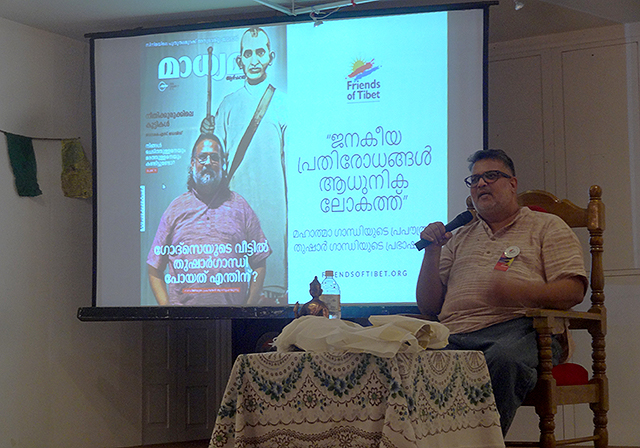
DOWNLOAD: Press Release | Event Poster | News Reports |
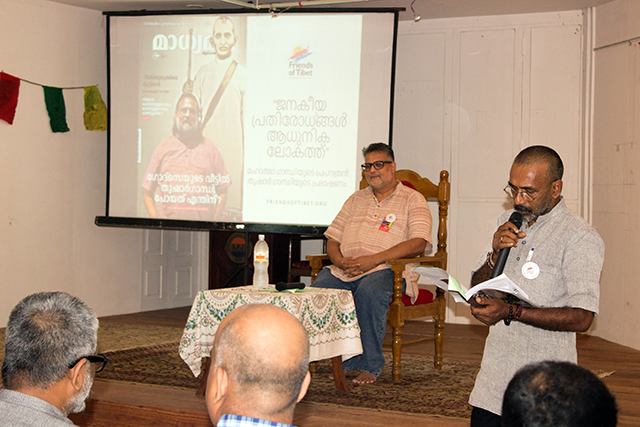
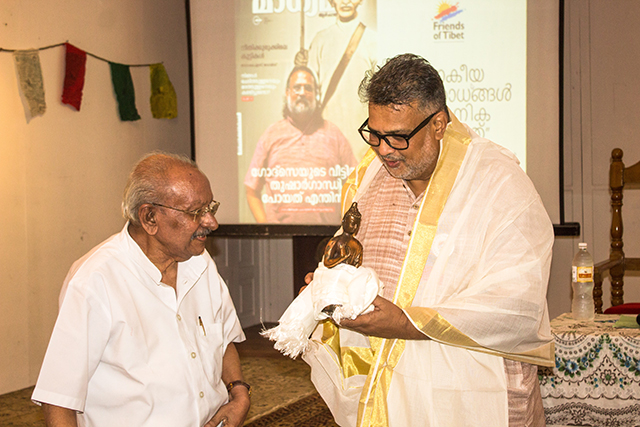
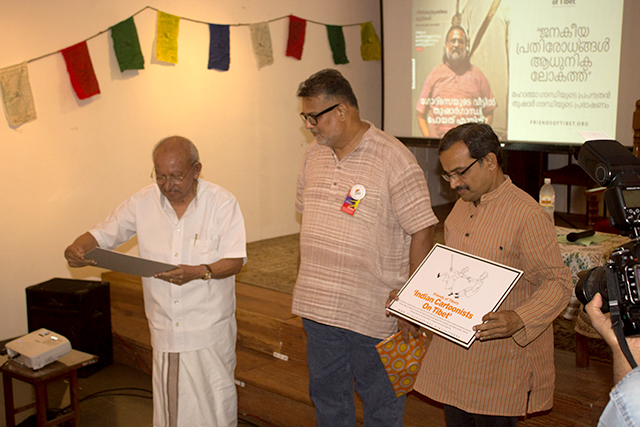
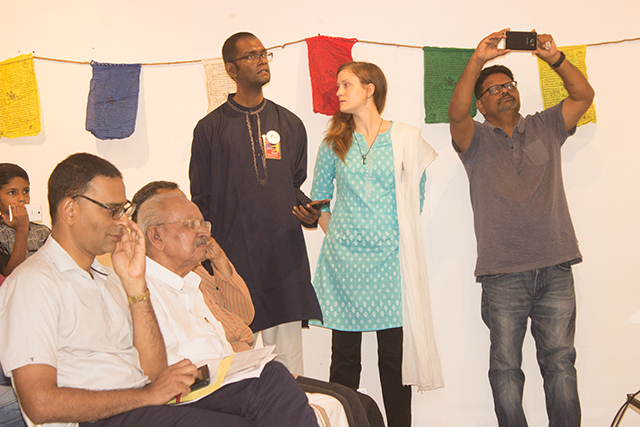
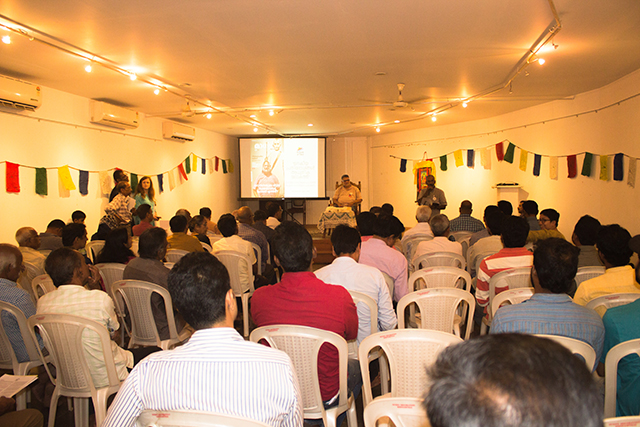
![]()
Email: freedom@friendsoftibet.org Web: www.friendsoftibet.org
